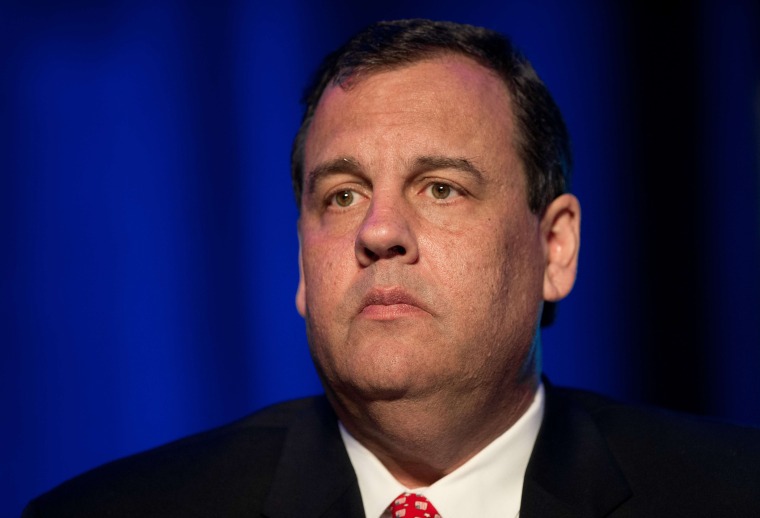The speculation about New Jersey Gov. Chris Christie's (R) plans two years from now is not only premature, it's also obscuring the fact that the governor has some pressing problems
right now.
A major Wall Street credit-rating agency downgraded New Jersey's debt again Thursday, unnerved by "both the scale and belatedness" of an $807 million budget gap disclosed this week by Gov. Chris Christie's administration. The action by Fitch Ratings followed a similar ratings cut last month by Standard & Poor's. Earlier this week, Moody's Investors Service called the shortfall a "credit negative development," forewarning that yet another downgrade may be coming. The Fitch analysts wrote that the downgrade "incorporates the state's ongoing budget strain created by overly optimistic revenue forecasts, a multitude of long-term spending pressures, and the state's repeated reliance on one-time solutions to achieve budgetary balance."
The more a state's debt is downgraded, the more difficult it is for the state to borrow for capital improvements.
State Sen. Paul Sarlo (D), the legislature's budget committee chairman,
told the Star-Ledger, "Credit-rating agencies have no faith in the fiscal health of the state of New Jersey because year in and year out we miss our revenue targets. If we continue at this pace, we're going to end up in junk-bond status. This is crazy."
And how does this relate to Christe? Because it was the governor who was warned about "overly optimistic revenue forecasts," and instead of taking them seriously, Christie bullied those who told him the truth.
"Governor Christie's predictions for tax collections have missed the mark," the Bergen Record's John Reitmeyer writes today, and the state now has an $800 million budget shortfall. It's only the latest in a series of optimistic budget estimates by Christie that have been disproven by reality. Economic forecasting is hard, and there isn't malfeasance behind every missed projection. But what makes this particularly embarrassing for Christie is that, when the state's top budget wonk criticized his past forecasts, Christie responded by insulting him and suggesting that he be fired.
Almost immediately after Christie released his budget projections for 2014 last year, they seemed wildly unrealistic. But as the governor geared up for re-election, he didn't want to increase taxes or make sharp spending cuts, so Christie assured everyone that a revenue windfall was on the way.
David Rosen, the chief budget officer for the last 30 years for New Jersey's Office of Legislative Services, tried to explain that the governor's projections simply weren't reliable. The governor, true to form,
attacked.
Weeks later, Christie went further, going after Rosen personally in what the Star-Ledger called "a fiery 20-minute tirade." He called Rosen, widely respected among legislators of both parties for years, a "Dr. Kevorkian of the numbers" and asked, "Why would anybody with a functioning brain believe this guy? ... How often do you have to be wrong to finally be dismissed?" Christie went on: "It should be humiliating to him. Nobody in this state believes David Rosen, anymore, nobody. And nobody should. He's so wrong, for so long, that his credibility is now gone."
But Rosen wasn't wrong; Christie was. In fact, Rosen's restrained criticism of the governor's numbers was too kind -- Christie was even further from reality than Rosen predicted.
In other words, the Republican governor was (a) wrong; (b) irresponsible with state finances; and (c) tried to bully the one credible figure who told Christie the truth he didn't want to hear. And now New Jersey is struggling to deal with the consequences.
Two weeks ago, at a town-hall forum, the governor
demanded proof that he'd created a culture of intimidation in Trenton. The evidence really isn't that hard to come by.
